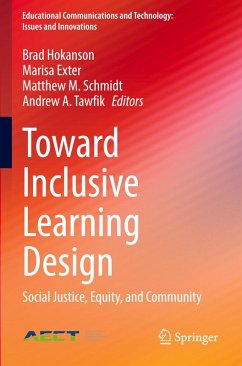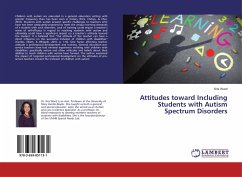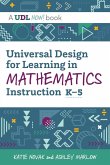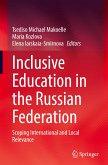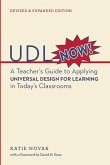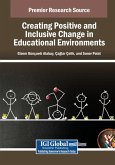Toward Inclusive Learning Design
Social Justice, Equity, and Community
Herausgegeben:Hokanson, Brad; Exter, Marisa; Schmidt, Matthew M.; Tawfik, Andrew A.
Toward Inclusive Learning Design
Social Justice, Equity, and Community
Herausgegeben:Hokanson, Brad; Exter, Marisa; Schmidt, Matthew M.; Tawfik, Andrew A.
- Broschiertes Buch
- Merkliste
- Auf die Merkliste
- Bewerten Bewerten
- Teilen
- Produkt teilen
- Produkterinnerung
- Produkterinnerung
This book examines how society has been affected by the social upheaval of the years since George Floyd's death and efforts by those in education and educational technology to address the concerns of equity, community and social justice.
This book is a practical yet scholarly guide in the pursuit of inclusive design, drawing from a diverse range of authors with a broad range of application and theory. The chapters go beyond a narrow view of inclusive learning design, and address issues in a broad range of fields.
This book is appropriate for all levels of learning, with a distinct focus on higher education and graduate education.…mehr
Andere Kunden interessierten sich auch für
![Attitudes toward Including Students with Autism Spectrum Disorders Attitudes toward Including Students with Autism Spectrum Disorders]() Kris WardAttitudes toward Including Students with Autism Spectrum Disorders27,99 €
Kris WardAttitudes toward Including Students with Autism Spectrum Disorders27,99 €![Universal Design for Learning in Mathematics Instruction, K-5 Universal Design for Learning in Mathematics Instruction, K-5]() Katie NovakUniversal Design for Learning in Mathematics Instruction, K-527,99 €
Katie NovakUniversal Design for Learning in Mathematics Instruction, K-527,99 €![Inclusive Education in the Russian Federation Inclusive Education in the Russian Federation]() Inclusive Education in the Russian Federation100,99 €
Inclusive Education in the Russian Federation100,99 €![Globalisation and Inclusive Schooling Globalisation and Inclusive Schooling]() Joseph ZajdaGlobalisation and Inclusive Schooling100,99 €
Joseph ZajdaGlobalisation and Inclusive Schooling100,99 €![UDL Now! UDL Now!]() Katie NovakUDL Now!33,99 €
Katie NovakUDL Now!33,99 €![Inclusive and Adaptive Teaching Inclusive and Adaptive Teaching]() Peter WestwoodInclusive and Adaptive Teaching198,99 €
Peter WestwoodInclusive and Adaptive Teaching198,99 €![Creating Positive and Inclusive Change in Educational Environments Creating Positive and Inclusive Change in Educational Environments]() Creating Positive and Inclusive Change in Educational Environments132,99 €
Creating Positive and Inclusive Change in Educational Environments132,99 €-
-
-
This book examines how society has been affected by the social upheaval of the years since George Floyd's death and efforts by those in education and educational technology to address the concerns of equity, community and social justice.
This book is a practical yet scholarly guide in the pursuit of inclusive design, drawing from a diverse range of authors with a broad range of application and theory. The chapters go beyond a narrow view of inclusive learning design, and address issues in a broad range of fields.
This book is appropriate for all levels of learning, with a distinct focus on higher education and graduate education.
This book is a practical yet scholarly guide in the pursuit of inclusive design, drawing from a diverse range of authors with a broad range of application and theory. The chapters go beyond a narrow view of inclusive learning design, and address issues in a broad range of fields.
This book is appropriate for all levels of learning, with a distinct focus on higher education and graduate education.
Produktdetails
- Produktdetails
- Educational Communications and Technology: Issues and Innovations
- Verlag: Springer / Springer Nature Switzerland / Springer, Berlin
- Artikelnr. des Verlages: 978-3-031-37699-3
- Seitenzahl: 548
- Erscheinungstermin: 10. November 2024
- Englisch
- Abmessung: 235mm x 155mm x 30mm
- Gewicht: 821g
- ISBN-13: 9783031376993
- ISBN-10: 3031376994
- Artikelnr.: 72106692
- Herstellerkennzeichnung Die Herstellerinformationen sind derzeit nicht verfügbar.
- Educational Communications and Technology: Issues and Innovations
- Verlag: Springer / Springer Nature Switzerland / Springer, Berlin
- Artikelnr. des Verlages: 978-3-031-37699-3
- Seitenzahl: 548
- Erscheinungstermin: 10. November 2024
- Englisch
- Abmessung: 235mm x 155mm x 30mm
- Gewicht: 821g
- ISBN-13: 9783031376993
- ISBN-10: 3031376994
- Artikelnr.: 72106692
- Herstellerkennzeichnung Die Herstellerinformationen sind derzeit nicht verfügbar.
Brad Hokanson is a professor in Graphic Design at the University of Minnesota, USA. He has a diverse academic record, including degrees in art, architecture, urban design, and received his Ph.D. in Instructional Technology. He teaches in the area of creative problem solving and has published research in the fields of creativity and educational technology. His most recent book on the development of creativity is Developing Creative Thinking in Learners. He also is currently the Director of Graduate Studies for Design. He won his colleges' awards for outstanding teaching in 2002 and 2008. He served as President of the Association of Educational Communication and Technology in 2017. He has led the Summer Research Symposium since 2012, and has served as lead editor of the books for the last five volumes of the series published by Springer. Dr. Marisa Exter has 15 years of experience in software design, development, and project management, and BS and MS in ComputerScience, along with a PhD in Instructional Systems Technology. Her research interests focus on formal and non-formal educational experiences professionals who use design processes to create technology (such as Instructional Design, Computing, and Engineering/Technology), with an aim to improving undergraduate education, especially through interdisciplinary programs and learning experiences. Marisa is a board member for the International Board of Standards for Training, Performance, and Instruction and co-coordinator of the Association for Educational Communications and Technology Summer Research Symposium. She is currently the Purdue PI for a $3M multi-institutional grant related to developing a model for computing competencies. Matthew Schmidt, Ph.D., is Associate Professor at the University of Florida, USA, in the Educational Technology program, faculty in the Institute for Advanced Learning Technologies, and director of the Advanced Learning Technologies Studio. His primary research interest includes design and development of innovative educational courseware and computer software with a particular focus on individuals with disabilities and their families/caregivers. His secondary research interests include immersive learning and learning experience design. Andrew A. Tawfk PhD, is an Associate Professor of Instructional Design & Technology at the University of Memphis, USA, where he also serves as the director for the Instructional Design & Technology Studio. His research interests include inquiry-based learning, case-based reasoning, and computer-supported collaborative learning. Additional interests include learning experience design and human-computer interaction.
1 Applying a Cultural Analysis Framework Before Engaging in Large-Scale Learning Design within Yunnan Province, China.- 2 Character-Infused Virtue Ethics and Implications for the Design of Character Development Training.- 3 Cultivating a Mindset for Culturally Inclusive Learning Design.- 4 Emotional Pathway of Becoming a Professional: Stories of Graduate Students & Recommendations for Academia.- 5 Instructional Design and Semiotics.- 6 Mobile Learning and Culturally-Situated Practices for Equity in Brazil.- 7 Towards Culturally-Inclusive Dialogue in Online Learning Race, Gender, Disability, & Intersectionality.- 8 Ableism Versus Inclusion: A Systems View on Accessibility Practices in Higher Education.- 9 Accountability in Learning Design and Research as an Ongoing Practice.- 10 Audio Description for 3-Dimensional (3D) Virtual Worlds.- 11 Being Cognizant of Diversity, Intersectionality, Privilege, Equity, and Inclusion as ECT Scholar-Practitioners.- 12 Expanding the Horizon: Formative Evaluation of Vocational Training Simulation Designed for Students with Intellectual Disabilities.- 13 On the Persistence of Pages.- 14 Supporting Teachers in Designing for Intersectionality.- 15 The Effects of COVID-19 on Student Achievement Gap: A Literature Review Social Justice.- 16 Diversity, Equity, Inclusion, and Justice in Action: A Study of Learning Experience Designers' Practices.- 17 Factoring Power and Positionality Into Research on Instructional Design Interventions.- 18 Forged in Fire: A Case Study of How the Class of COVID-19 Empowered Unheard Communities in the Fight for Social Justice.- 19 How Can Instructional Design Promote Social Justice and Equity in Learning Communities? A Holistic View from the Perspective of Bloom's Taxonomy, Maslow's Hierarchy, and Quality Assurance.- 20 Libraries as Addressing STEM Equity Issues in Underserved Urban Settings.- 21 Social Justice Math as a Catalyst for Developing Independent Learners and Critical Thinkers in an Urban AfterSchool Math Mentoring Program for Middle School Students.- 22 Trajectories of Student Engagement with Social Justice-Informed Design Work.- 23 UDL in Educational Technologies for English Language Learners: A Scoping Review of Literature Critical Race Theory & Human Rights.- 24 Critical Instructional Design as Social Action: Cases from a Canadian Context.- 25 Designing in Pursuit of Liberation.- 26 Equity, Parents and Technology - Mother's Post-pandemic Perspectives of Children's Online Experiences during COVID-19.- 27 Human Capital, Rights, and Capabilities: Equitable Learning Design based on Justice.- 28 Reckoning with Medical Racism: A Literature Review on Inclusive Learning Design in Medical Training.- 29 Transformative Learning Experiences: Bringing Learners Together to Address Equity and Social Justice Through Project-based Language learning in the Online Classroom Diversity, Equity, & Inclusion.- 30 "Faced with Given Circumstances": A Localized Context of Use Approach.- 31 A Systemic Approach Toward Needs Assessment to Promote Inclusive Learning Design.- 32 Adapting a Neuroscience High School Curriculum to Support Inclusive Online Learning.-33 Asking Better Questions: Broadening Inquiry to Design more Inclusive and Equitable Learning Experiences for Adults.- 34 Business Education for Responsible Leadership: Preparing Students.- 35 Centering Learner Agency and Empowerment: Promoting Voice and Choice in Online Courses.- 36 Collaborative Experiential Learning as Trauma-Informed Instructional Design.- 37 Developing an Inclusive Community in a Virtual Environment x 38 Knowledge Sharing for Inclusive Learning.- 39 Reimagining PBL to Develop Critical Thinking Skills for All Learners.- 40 Using Technology to Foster Inclusion and Diversity in Higher Education: A Case study of Geospatial Tools in Engineering Education.
1 Applying a Cultural Analysis Framework Before Engaging in Large-Scale Learning Design within Yunnan Province, China.- 2 Character-Infused Virtue Ethics and Implications for the Design of Character Development Training.- 3 Cultivating a Mindset for Culturally Inclusive Learning Design.- 4 Emotional Pathway of Becoming a Professional: Stories of Graduate Students & Recommendations for Academia.- 5 Instructional Design and Semiotics.- 6 Mobile Learning and Culturally-Situated Practices for Equity in Brazil.- 7 Towards Culturally-Inclusive Dialogue in Online Learning Race, Gender, Disability, & Intersectionality.- 8 Ableism Versus Inclusion: A Systems View on Accessibility Practices in Higher Education.- 9 Accountability in Learning Design and Research as an Ongoing Practice.- 10 Audio Description for 3-Dimensional (3D) Virtual Worlds.- 11 Being Cognizant of Diversity, Intersectionality, Privilege, Equity, and Inclusion as ECT Scholar-Practitioners.- 12 Expanding the Horizon: Formative Evaluation of Vocational Training Simulation Designed for Students with Intellectual Disabilities.- 13 On the Persistence of Pages.- 14 Supporting Teachers in Designing for Intersectionality.- 15 The Effects of COVID-19 on Student Achievement Gap: A Literature Review Social Justice.- 16 Diversity, Equity, Inclusion, and Justice in Action: A Study of Learning Experience Designers' Practices.- 17 Factoring Power and Positionality Into Research on Instructional Design Interventions.- 18 Forged in Fire: A Case Study of How the Class of COVID-19 Empowered Unheard Communities in the Fight for Social Justice.- 19 How Can Instructional Design Promote Social Justice and Equity in Learning Communities? A Holistic View from the Perspective of Bloom's Taxonomy, Maslow's Hierarchy, and Quality Assurance.- 20 Libraries as Addressing STEM Equity Issues in Underserved Urban Settings.- 21 Social Justice Math as a Catalyst for Developing Independent Learners and Critical Thinkers in an Urban AfterSchool Math Mentoring Program for Middle School Students.- 22 Trajectories of Student Engagement with Social Justice-Informed Design Work.- 23 UDL in Educational Technologies for English Language Learners: A Scoping Review of Literature Critical Race Theory & Human Rights.- 24 Critical Instructional Design as Social Action: Cases from a Canadian Context.- 25 Designing in Pursuit of Liberation.- 26 Equity, Parents and Technology - Mother's Post-pandemic Perspectives of Children's Online Experiences during COVID-19.- 27 Human Capital, Rights, and Capabilities: Equitable Learning Design based on Justice.- 28 Reckoning with Medical Racism: A Literature Review on Inclusive Learning Design in Medical Training.- 29 Transformative Learning Experiences: Bringing Learners Together to Address Equity and Social Justice Through Project-based Language learning in the Online Classroom Diversity, Equity, & Inclusion.- 30 "Faced with Given Circumstances": A Localized Context of Use Approach.- 31 A Systemic Approach Toward Needs Assessment to Promote Inclusive Learning Design.- 32 Adapting a Neuroscience High School Curriculum to Support Inclusive Online Learning.-33 Asking Better Questions: Broadening Inquiry to Design more Inclusive and Equitable Learning Experiences for Adults.- 34 Business Education for Responsible Leadership: Preparing Students.- 35 Centering Learner Agency and Empowerment: Promoting Voice and Choice in Online Courses.- 36 Collaborative Experiential Learning as Trauma-Informed Instructional Design.- 37 Developing an Inclusive Community in a Virtual Environment x 38 Knowledge Sharing for Inclusive Learning.- 39 Reimagining PBL to Develop Critical Thinking Skills for All Learners.- 40 Using Technology to Foster Inclusion and Diversity in Higher Education: A Case study of Geospatial Tools in Engineering Education.

